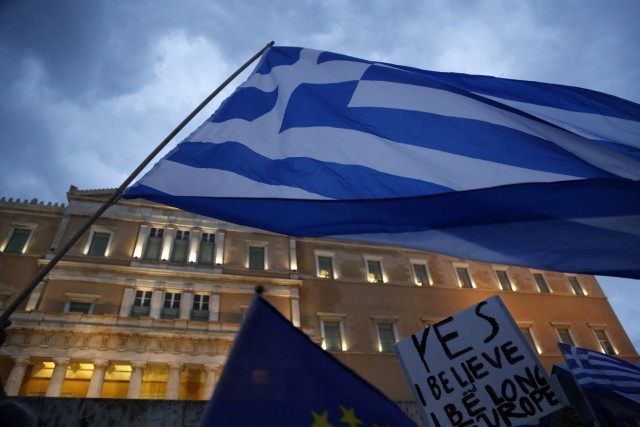So, farewell then Greece. The land of early retirement, lavish state pensions, tax evasion, official corruption and perpetual socialist indulgence – all of it underwritten by other people’s money – has become the first western country to default on an IMF loan. Incredibly this seems to have taken some people by surprise.
Step forward European Commission chief Jean-Claude Juncker. He said last night: ‘Important events for which we are not prepared are taking place in Athens.’ Not prepared for? Really Mr Juncker? The whole world has watched Greece slowly sink into the abyss for years yet only now the EU seems to be realising that Athens has a bit of a problem.
The numbers alone should have given Brussels a clue. Since joining the Eurozone in 2001, Greece has borrowed a sum 1.7 times its 2013 GDP. Its 25 per cent unemployment (50 per cent among young workers) results from a 25 per cent shrinkage of GDP and an income tax collection rate that verges on the pathetic.
So much debt and so much failure of governance, all the while it seems the EU has been busy with other things. Nobody knows quite what, but looking the other way and hoping for the best might be one of them.
So it’s fair to ask just why would the UK want to stay in the EU.
Why indeed. Just look at the company we keep. The EU debt clock shows the staggering amounts of indebtedness of member states and its prodigious rate of growth. The per capita debt clock averaged out per country across member states is €24,417. In Greece the figure stands at €28,921 while in Portugal it is €21,498 and in Spain €22,729 – to name a few. Here in the UK the per capita debt level stands at £24,441 – hardly a brilliant figure but there’s one difference that sets the us apart – a growing economy.
Yesterday the Office for National Statistics revealed that its estimate of the UK’s growth for the first quarter had increased from 0.3 to 0.4 per cent, driven by increasing consumer buying power. The UK is now expected to be the fastest growing economy in the G7 by the end of the year. Analysts are even more bullish, forecasting a 0.7 per cent growth rate for the second quarter of 2015.
Now look back across the Channel. Eurozone ministers will hold further talks today in a bid to find a solution to Greece’s manifest problems but the time for talking is probably long past. All eyes will instead turn to Sunday’s referendum on whether to accept the final deal offered by Greece’s creditors.
Meanwhile the European Central Bank will be pressured to pull the plug on Greece’s banks, which have been on life support for years. They could collapse within 48 hours without help, forcing the Greek government to nationalise them and revert to the drachma while at the same time preparing for a bond issue.
Greek deputy prime minister Yannis Dragasakis hinted last night the referendum might even be called off. He told state TV the government had decided to hold the ballot but ‘can make a decision on something else.’ Presumably this means going back and asking yet again for more money.
Dragasakis also confirmed that Athens had asked the International Monetary Fund for an extension of the 1.6bn Euros payment due on Tuesday after the bailout programme expired at midnight Tuesday.
What an absolute mess the Eurozone has become. Does David Cameron really think he can mount a persuasive argument for the UK to stay in a minute longer or will he be the only rat swimming towards that sinking ship?
Answers on a postcard please.

COMMENTS
Please let us know if you're having issues with commenting.